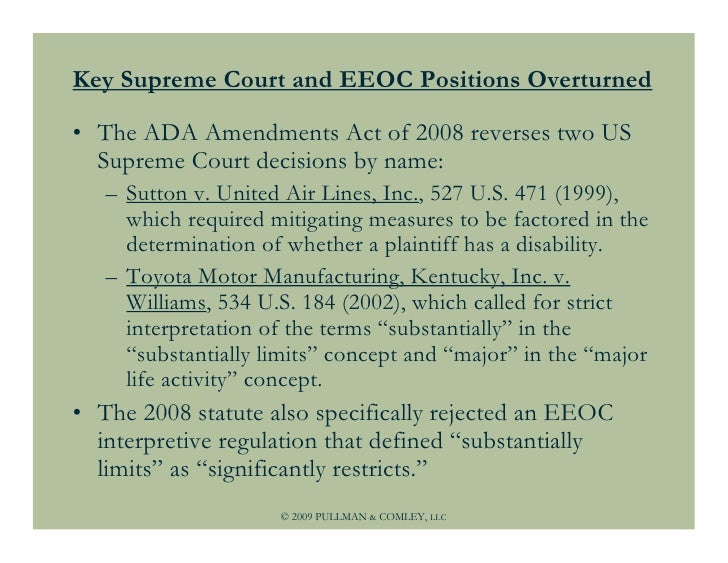A Brief History of Civil Rights in the United States: ADA Amendments Act of 2008
The ADA Amendments Act of 2008 (ADAAA) amended the Americans with Disabilities Act of 1990 (ADA) and other disability discrimination laws at the federal level.
The ADAAA was passed in September of 2008 in response to a number of decisions by the Supreme Court that had interpreted the original text of the ADA. Congress stated in its introduction to the ADAAA that those decisions limited the rights of persons with disabilities so the ADAAA reversed those decisions by broadening the law. Specifically, the ADAAA changed the definition of the term "disability" by clarifying and broadening it - which, in turn, increased the number and types of persons protected under the ADA and other federal nondiscrimination laws. The ADAAA was designed to strike a balance between employer and employee interests, as it was felt that employer interests had been favored too much previous to the amendments.
One thing that the ADAAA required was that courts interpreting the ADA and other federal disability laws focus on whether the covered entity had discriminated, rather than whether the individual seeking the law's protection had an impairment that fit within the technical definition of the term "disability." The Act retained the ADA's basic definition of "disability" as an impairment that substantially limits one or more major life activities. It also retained the need for a record of such an impairment or being regarded as having such an impairment. However, the ADAAA changed the way that the statutory terms should be interpreted, again in the interest of broadening the interpretation, rather than accepting the previous narrow interpretations.

Notable Supreme Court Cases:
- Sutton et al. v. United Airlines, Inc., 527 U.S. 471 (1999) - this is the case where the Court's definition of "disabled" under the ADA led to instances where employers could terminate a person from a job because of a physical or mental condition and then argue the condition was not serious enough to constitute a disability.
- Toyota Motor Manufacturing, Kentucky, Inc. v. Williams, 534 U.S. 184 (2002) - in this case, the Court held that Congress intended to create a demanding standard to meet the definition of "disabled" in the ADA and suggested that people must be visibly and functionally unable to perform in specific, socially expected ways to be entitled to ADA protection.
- U.S. Airways, Inc. v. Barnett, 535 U.S. 391 (2002) - this case gave the Court's characterization of "reasonable accommodations" as special and preferential, which fueled misconceptions that the ADA gave people with disabilities some type of advantage over those without disabilities.
- Chevron U.S.A., Inc. v. Echazabal, 536 U.S. 73 (2002) - this case invited paternalistic conjecturing by employers and their physicians about perceived dangers to individuals with disabilities, often based on ignorance and misconceptions about particular conditions, and fostered perceptions that individuals with disabilities were commonly irrationally self-destructive.
- Barnes v. Gorman, 536 U.S. 181 (2002) - in this case, the Court removed a potent potential sanction against egregious violators of Section 504 and Title II of the ADA.
Selected Library Resources:
- Marcela Rhoads, The ADA Companion Guide: Understanding the Americans With Disabilities Act Accessibility Guidelines (ADAAG) and the Architectural Barriers Act (ABA), KF5709.3.H35 R48 2010
- National Association of the Deaf, Legal Rights: The Guide for Deaf and Hard of Hearing People, KF480.5.D4 L43 2015
- Peter D. Blank, eQuality: The Struggle for Web Accessibility by Persons with Cognitive Disabilities,KF480 .B566 2014
- Westlaw - Americans with Disabilities: Practice & Compliance Manual
- Lexis - Legal Rights of Individuals with Disabilities (MCLE)
- Westlaw - Disability Discrimination Under the ADA Practice Note
- Westlaw - Disability Accommodation Under the ADA Practice Note
Additional Resources:


